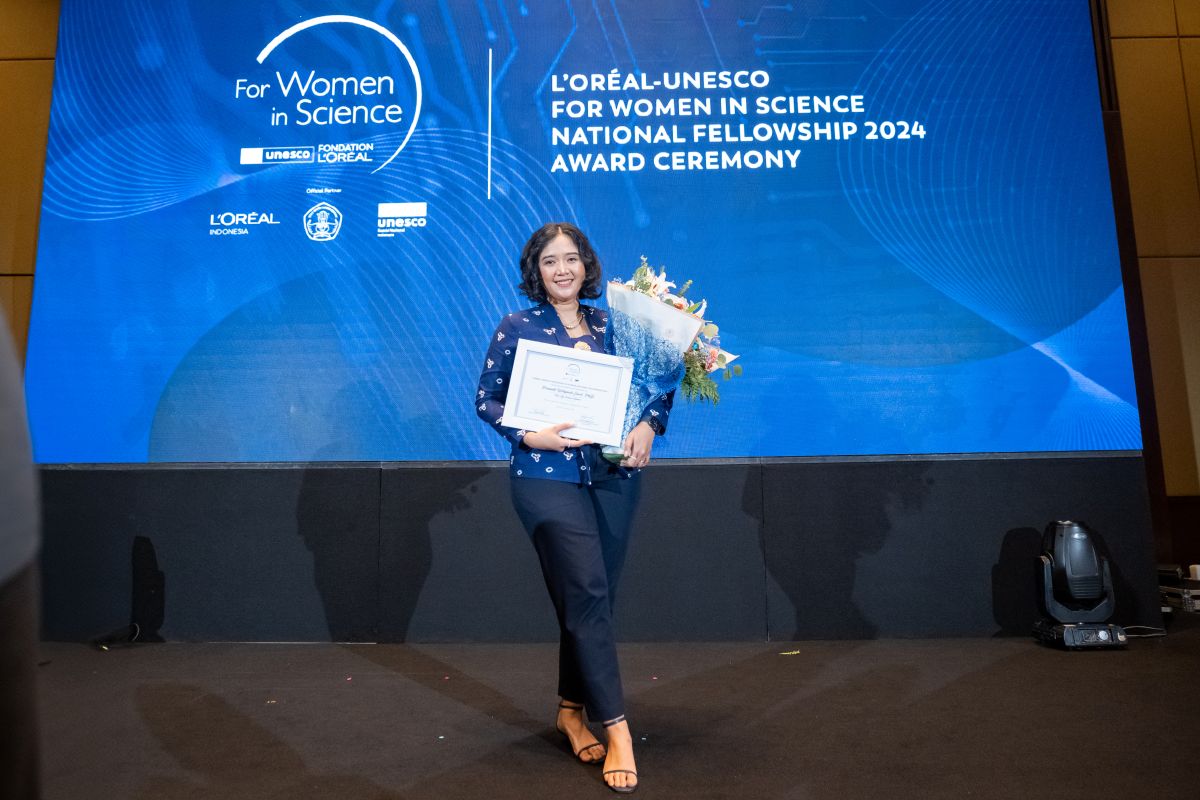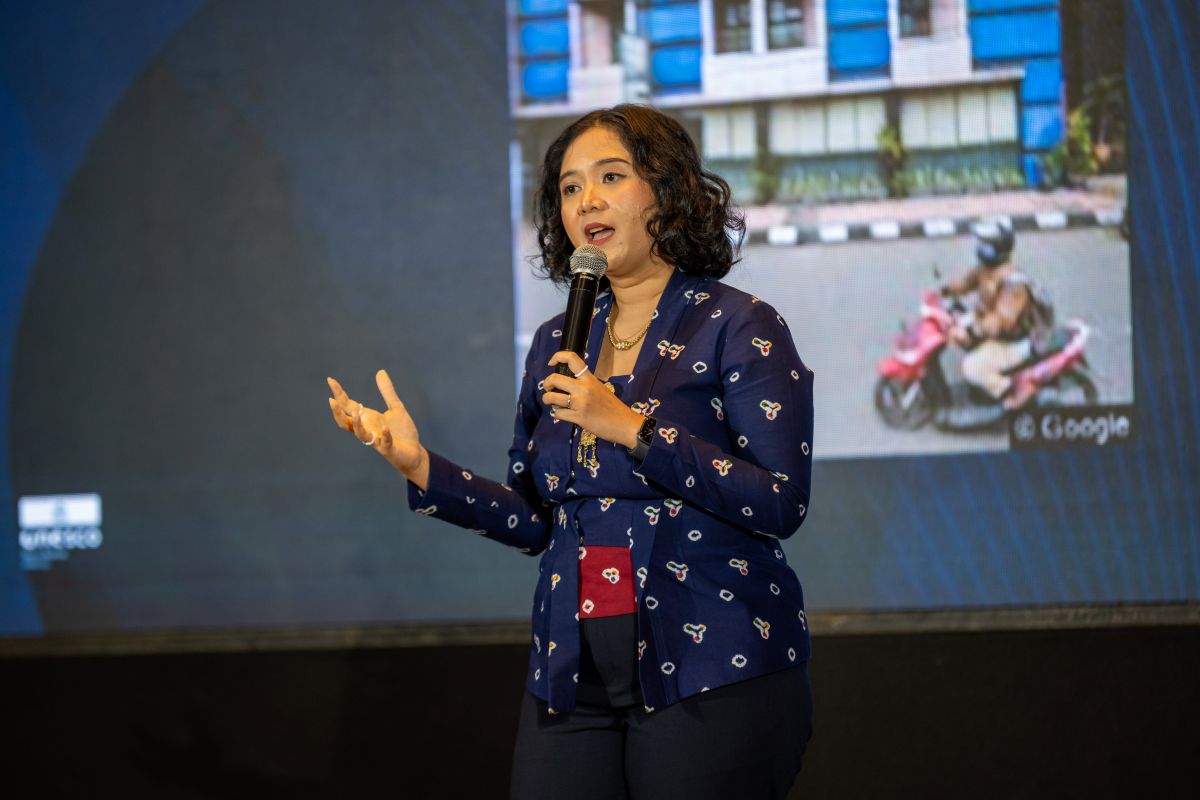
Prasanti Widyasih Sarli, S.T., M.T., Ph.D., Receives the 2024 For Women in Science (FWIS) Award from L’Oréal-UNESCO (Courtesy of L’Oréal Indonesia)
BANDUNG, itb.ac.id – Prasanti Widyasih Sarli, S.T., M.T., Ph.D., a lecturer and researcher from the Faculty of Civil and Environmental Engineering, Institut Teknologi Bandung (FTSL ITB), has been awarded the 2024 For Women in Science (FWIS) Award by L’Oréal-UNESCO in Jakarta on Monday (November 11, 2024). The FWIS Award recognizes talented young female researchers who dedicate their careers to advancing scientific innovation and contributing to sustainable development and societal progress.
The Journey to Receiving the Award
A lecturer from theStructural Engineering Research Groupat FTSL ITB shared her journey to receiving the prestigious award. She explained that the L'Oréal-UNESCO award is granted for research proposals. "In August, following the kind suggestion of a senior from BRIN—who had previously seen my research presentation—I finally gathered the courage to apply," she said on Sunday (November 17, 2024).
After submitting her proposal, she was selected as one of 10 finalists based on the written documentation. In October, she delivered a live presentation before a panel of judges. Out of the 10 finalists, four winners were chosen—two for the Non-Life Science dan Life Science category. She received the award in the Non-Life Science category.
“All praise to God, I never expected to win at that stage. During the presentation, we were given only 5 minutes to explain our research, followed by a Q&A session. Honestly, I felt a bit unsure of myself at the time, but then I made it through. This experience has been incredibly valuable for me," said the author of the books"To be in Love with You is to be in Love with Myself" dan "Menjadi Manusia".
Research Topic
Through her research titled "Resilience for All: Indonesian Large Scale Housing Assessment",she presented her vision with her research team to develop AI-based technology capable of quickly and accurately predicting structural vulnerabilities using only photos. "Currently, the pilot phase of this research is underway. However, to truly provide widespread benefits, we certainly need support and collaboration from various stakeholders," she said.
The author of the book "Air dan Sanitasi Kawasan Kumuh" noted that in many poor and developing countries, including Indonesia, data is incredibly difficult to obtain. This is especially true for building data, which, even when available, is often not digitized or centralized. However, when discussing risk analysis for an area’s vulnerabilities—whether a city, province, or even a nation—understanding the structure of each building, from homes and schools to government buildings and infrastructure like bridges, becomes critically important.
“We hope the AI technology we are developing, which can identify building typologies using just photos, can help map an area’s risks quickly and affordably—even using images from Google Street View. Of course, this is not a perfect solution, but we hope to continue refining this technology in the future," she added.

Prasanti Widyasih Sarli, S.T., M.T., Ph.D., Recipient of the 2024 For Women in Science (FWIS) Award from L’Oréal-UNESCO (Courtesy of L’Oréal Indonesia)
As one of her colleagues once said, building an application or system like this is a lifelong endeavor. She and her team are highly motivated to commit to this project in the long term because they firmly believe that accurate risk mapping is crucial to ensuring every life in the country receives the best protection during disasters.
This research, she explained, can generally be conducted in any city. “Currently, we have started analyzing data for Bandung and Padang. In the future, we will likely focus more on cities in West Java first,” she said.
The award, she shared, means a great deal to her. “The journey of being a researcher often feels like walking alone and groping in the dark. Many times, I’ve asked myself whether the path I’ve chosen is truly the right one. But awards like this somehow encourage me and make me feel like what I’ve been doing all along might actually be right, and perhaps I’m heading in the right direction,” she said.
She emphasized that Civil Engineering is an essential field of study as it serves as the foundation of human life. Many people fail to realize how critical this field is, even though every aspect of daily life—from housing and mobility to access to drinking water—relies on the contributions of civil engineers.
“I often quote David Billington, the late Professor of Structural Engineering at Princeton, who said, ‘Civilization is civil works, and insofar as these deteriorate, so does society.’ These words constantly remind me that our work plays a significant role in maintaining and advancing civilization. If we are not dedicated and fully committed to this field, civilization will regress,” she said.
She also advised her students to take their field seriously and to take pride in what they study because they are the foundation of the world.
“Work wholeheartedly to ensure that our civilization continues to progress and becomes better than ever before,” she urged
After receiving the award, she is determined to work and conduct her research even more effectively. “In the end, this award is just a small stepping stone toward the true dream—creating something meaningful for our country and the world, no matter how small it is. But for now, let us celebrate this little stepping stone!” she concluded.